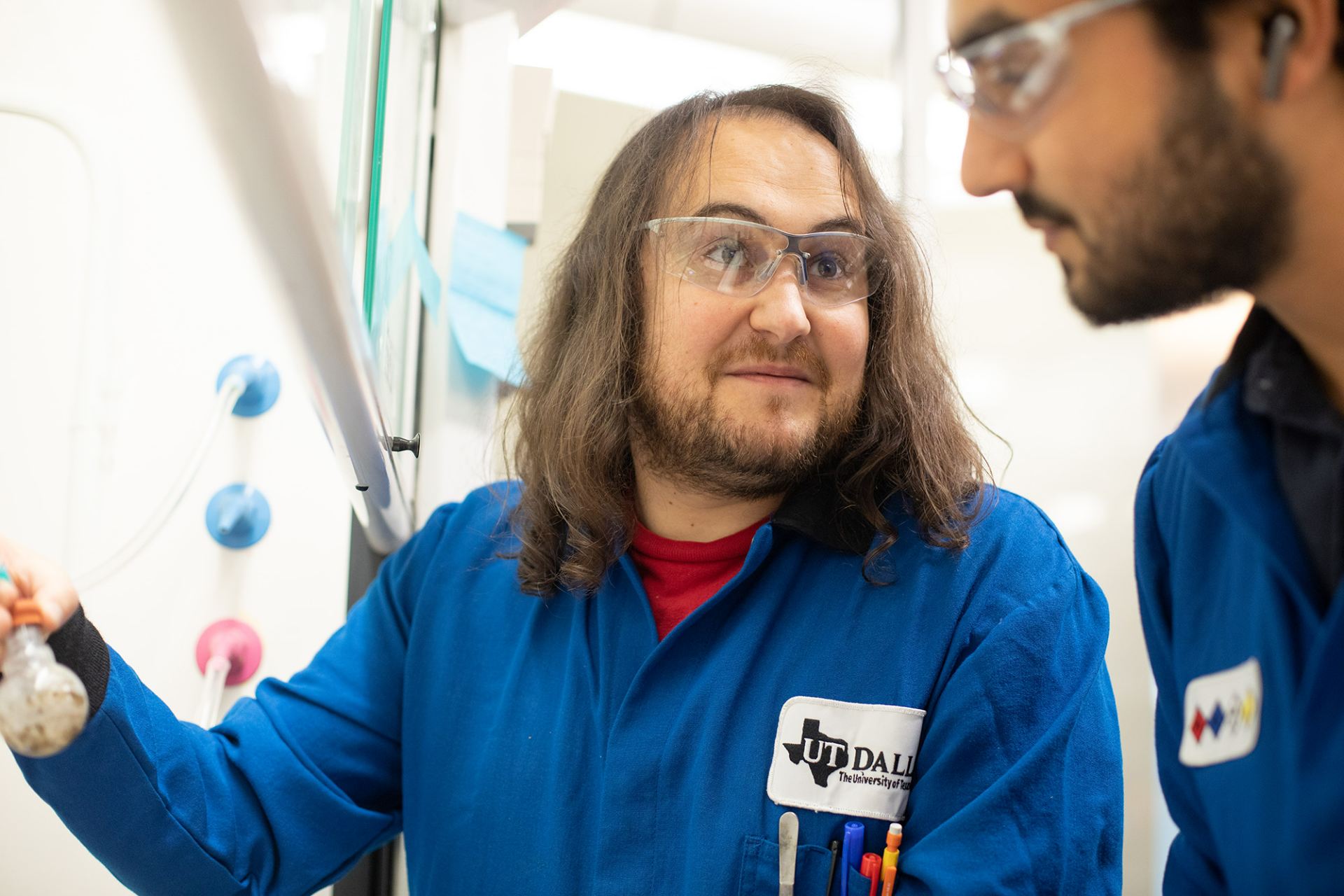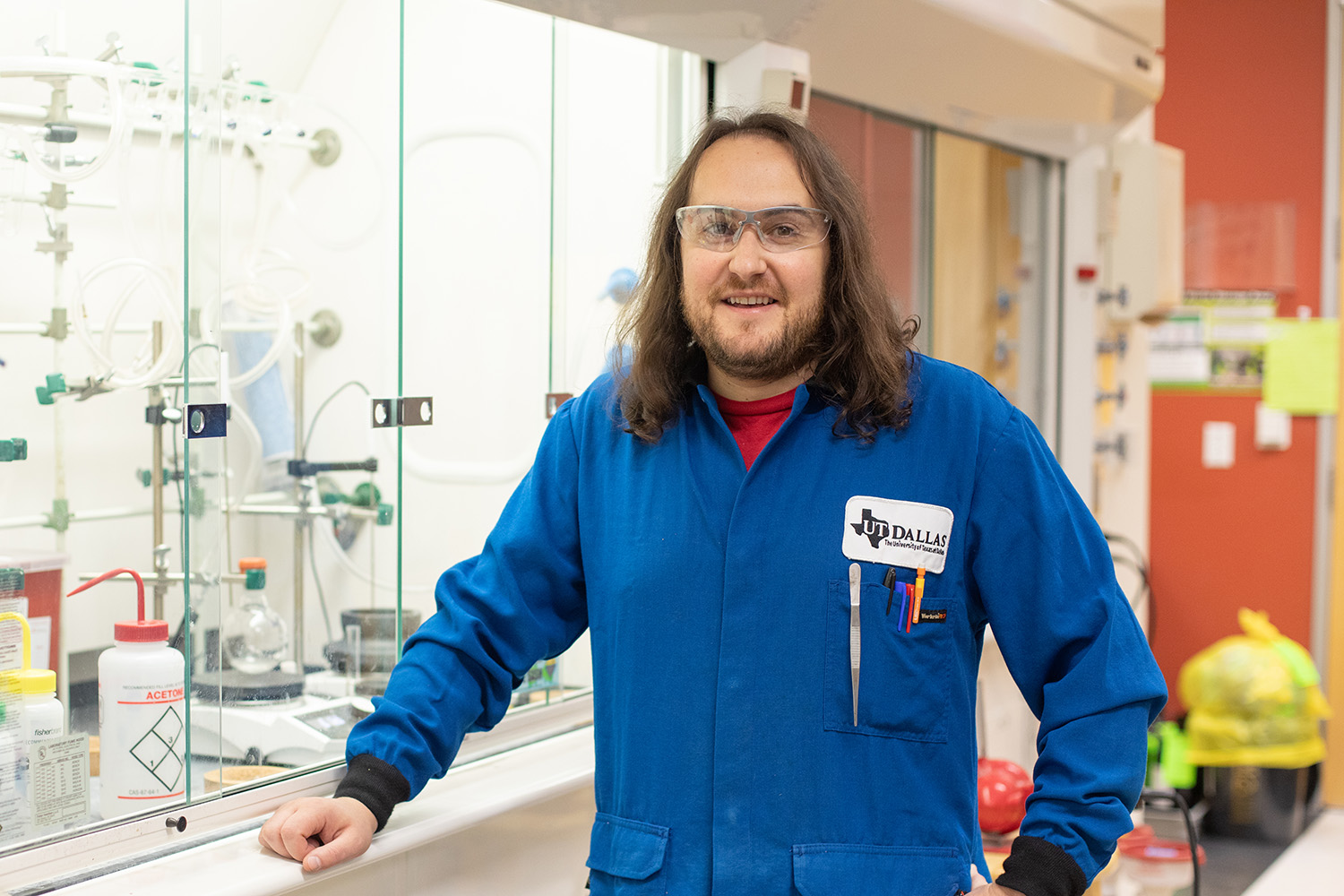New CPRIT Scholar Finds ‘Perfect’ Home at UTD To Pursue Research
By: Amanda Siegfried | Oct. 5, 2022

Dr. Filippo Romiti’s parents — both scientists — inspired him to pursue a career in chemistry, a path that has led him to The University of Texas at Dallas, where he has begun his work as an independent investigator backed by a $2 million grant.
This summer Romiti joined the UT Dallas chemistry and biochemistry department in the School of Natural Sciences and Mathematics with support from the First-Time, Tenure-Track Faculty Member program of the Cancer Prevention and Research Institute of Texas (CPRIT). The program is designed to attract top talent in cancer research to the state. Known as CPRIT Scholars, these independent investigators are expected to make outstanding contributions in cancer research.
Romiti’s research focuses on the synthesis of bioactive natural products, which are molecules that occur in plants or animals and show promise as medicinal agents.

“Nature doesn’t make medicines specifically for us, but some molecules have interesting biological activity that could be adjusted for use against diseases like cancer, Parkinson’s or Alzheimer’s,” said Romiti, assistant professor of chemistry. “I am developing novel, creative and practical methods and strategies to synthesize these natural compounds.”
Romiti likened his research to developing the underlying technology that took humans to the moon.
“Making a very complex molecule that no one else has made would certainly be an achievement,” he said. “But like in the moon landing, all the technology, all the information the scientists and engineers developed also became the basis for much of the everyday technology we have now.
“In the same way, I try to develop synthesis methods that will be the platform pharmaceutical companies will use in the future to make or improve drugs.”
The Road to Texas
A native of Italy, Romiti was surrounded by science from an early age. His parents are now retired and enjoying life in the Tuscan countryside, but his father was a pharmacist, and his mother was a high school chemistry teacher and a pharmacist. While growing up, his interests were music, soccer and chemistry.
“I love music, but I have no talent for it,” Romiti said. “Until I was 18, I played pretty high-level soccer, but I knew I could not make a living at it, so I tried chemistry.”
In his first semester as an undergraduate at the University of Parma, Romiti had the opportunity to do laboratory research.
“Dr. Romiti is one of the brightest, most motivated, enthusiastic and personable people I have ever met. He brings to UT Dallas an important expertise on new convergent methods for synthesis of complex and natural products.”
Dr. Vladimir Gevorgyan, the Robert A. Welch Distinguished Chair in Chemistry at UTD
“My professors were such great teachers that I fell in love with organic chemistry. From then, I knew that’s what I wanted to do,” he said.
Romiti received a combined bachelor’s and master’s degree in pharmacy from the University of Parma and his PhD from the University of Glasgow in Scotland. He spent four years as a postdoctoral fellow at Boston College and then moved with his advisor to France, where Romiti was a senior research associate at the Supramolecular Science and Engineering Institute at the University of Strasbourg.
Romiti’s path to Texas began when Dr. Vladimir Gevorgyan, the Robert A. Welch Distinguished Chair in Chemistry who joined the UT Dallas faculty in 2019, contacted a colleague for recommendations for a faculty opening in organic chemistry. That colleague happened to be Romiti’s advisor, Dr. Amir H. Hoveyda, who suggested Romiti.
“I had options, but one thing that was key for me to come to UT Dallas was the immediate positive impact that Dr. Gevorgyan and other faculty members here had on me,” Romiti said. “The personal relationships with your colleagues are very important. When I visited UT Dallas, I immediately felt at home. UTD was the perfect place at the perfect time.”

To learn more about how UT Dallas is enhancing lives through transformative research, explore New Dimensions: The Campaign for UT Dallas.
Gevorgyan and Romiti are part of the core of a growing synthetic organic chemistry section at UTD.
“Dr. Romiti is one of the brightest, most motivated, enthusiastic and personable people I have ever met,” Gevorgyan said. “He brings to UT Dallas an important expertise on new convergent methods for synthesis of complex and natural products, which is vital for the center of synthetic organic chemistry we are developing. There is no doubt that he is an ideal candidate for this niche.”
Romiti added: “I have the chance to make significant contributions to the direction and growth of this section and to shape my own future. There are very few universities where a junior faculty member can be part of that.”
Romiti said he is looking forward to adding undergraduate researchers to his new lab.
“My group in Parma adopted me, even though I was only a first- or second-year undergrad,” he said. “They allowed me to ask them questions; they involved me; and this grew my passion for chemistry even more. I would definitely like to transmit this to undergrads at UTD.”
Founded in 2008, CPRIT has awarded $3.1 billion in grants to Texas research institutions and organizations through its academic research, prevention and product development research programs. With this latest grant, UT Dallas has received more than $20.7 million from CPRIT to support cancer studies.
Media Contact:
Amanda Siegfried, UT Dallas, 972-883-4335, amanda.siegfried@utdallas.edu, or the Office of Media Relations, UT Dallas, (972) 883-2155, newscenter@utdallas.edu.





